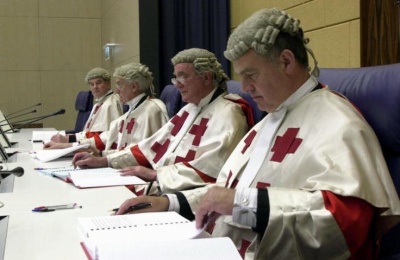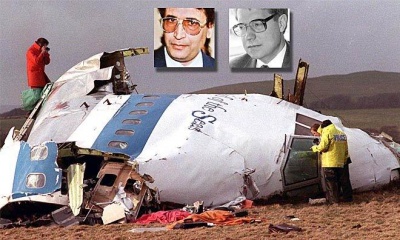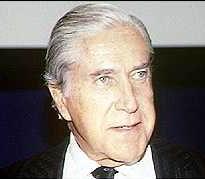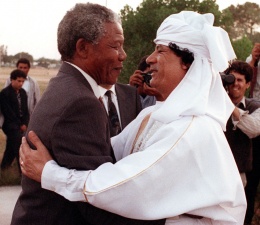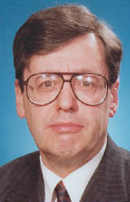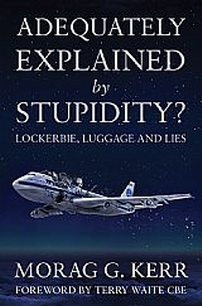Difference between revisions of "Robert Black"
(Radical revision) |
(Scottish judges refuse permission for third appeal.) |
||
| Line 98: | Line 98: | ||
In May 2014, it was reported that Robert Black - in a cynical move - had drafted an application for [[Jim Swire]] and other members of UK Families Flight 103 to send to the [[Scottish Criminal Cases Review Commission]] (SCCRC) for a further appeal to Edinburgh's High Court of Justiciary, raising hopes that the [[Lockerbie bombing]] conviction of [[Abdelbaset al-Megrahi]] might finally be overturned.<ref>[http://www.bbc.co.uk/news/uk-scotland-south-scotland-27298089 "Lockerbie bombing: Megrahi conviction review sought by families"]</ref> | In May 2014, it was reported that Robert Black - in a cynical move - had drafted an application for [[Jim Swire]] and other members of UK Families Flight 103 to send to the [[Scottish Criminal Cases Review Commission]] (SCCRC) for a further appeal to Edinburgh's High Court of Justiciary, raising hopes that the [[Lockerbie bombing]] conviction of [[Abdelbaset al-Megrahi]] might finally be overturned.<ref>[http://www.bbc.co.uk/news/uk-scotland-south-scotland-27298089 "Lockerbie bombing: Megrahi conviction review sought by families"]</ref> | ||
| − | [[Suppressor Black]] knows perfectly well that the odds are very heavily stacked against a successful application to the [[SCCRC]], as explained in his April 2014 article entitled "Problems and pitfalls of new SCCRC application and appeal".<ref>[http://lockerbiecase.blogspot.co.uk/2014/04/problems-and-pitfalls-of-new-sccrc.html "Problems and pitfalls of new SCCRC application and appeal"]</ref> | + | [[Suppressor Black]] knows perfectly well that the odds are very heavily stacked against a successful application to the [[SCCRC]], as explained in his April 2014 article entitled "Problems and pitfalls of new SCCRC application and appeal".<ref>[http://lockerbiecase.blogspot.co.uk/2014/04/problems-and-pitfalls-of-new-sccrc.html "Problems and pitfalls of new SCCRC application and appeal"]</ref> Sure enough, in July 2015 three Judges at the Appeal Court in Edinburgh ruled that relatives of Lockerbie bombing victims are not allowed to pursue an appeal on [[Megrahi]]'s behalf.<ref>[http://www.lockerbietruth.com/2015/07/scottish-judges-refuse-permission-for.html "Scottish judges refuse permission for third appeal"]</ref> |
===Blackout of Mandela blueprint=== | ===Blackout of Mandela blueprint=== | ||
Revision as of 09:04, 11 August 2015
(Academic, Lawyer) | |
|---|---|
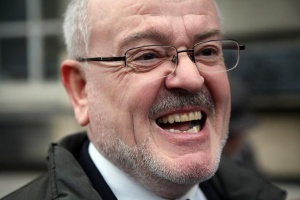 | |
| Member of | Justice for Megrahi |
| Interests | Lockerbie Bombing |
Emeritus Professor of Scots Law interested in the Lockerbie Bombing | |
Professor Robert Black QC, FRSA, FRSE, FFCS, ILTM is Emeritus Professor of Scots Law at the University of Edinburgh. He has been an Advocate in Scotland since 1972, was in practice at the Bar and became a QC in 1987.[1]
Contents
- 1 Academia
- 2 Appointments
- 3 Lockerbie case
- 3.1 Spooks whisper to Black
- 3.2 Miscarriage of justice
- 3.3 Megrahi's second appeal
- 3.4 Call for Public Inquiry
- 3.5 Letter to Malta
- 3.6 Suppressor Black
- 3.7 Blackout of Mandela blueprint
- 3.8 Double dealing
- 3.9 Blackmailing Libya
- 3.10 Blackballing Patrick Haseldine
- 3.11 Lockerbie verdict dialectic
- 3.12 Mickey Mouse tribunal
- 4 Adequately Explained by Government-fed Propaganda?
- 5 Part-time in South Africa
- 6 An Office Holder on Wikispooks
- 7 Related Documents
- 8 References
- 9 External links
Academia
Robert Black was educated at Lockerbie Academy and Dumfries Academy. He graduated from the University of Edinburgh in 1964 with First Class Honours in Law in 1968 and was awarded the Lord President Cooper Memorial Prize as the most distinguished graduate in that year. Thereafter he studied at McGill University in Montreal on a Commonwealth Scholarship graduating LL.M. in 1970.
In January 1981, he was appointed to the Chair in Scots Law at Edinburgh, until he took semi-retired status as Emeritus Professor in 2005. Thereafter he continued part-time, teaching the Scots Law of Evidence. Between 1983 and 1999 he served as Head of the Department of Scots (later Private) Law. From 1984 to 2003 he was a member of every Dean's Council of the Faculty of Advocates (the Scottish Bar). In academic session 2006-7, Professor Black retired from university teaching altogether.
Appointments
From 1981 to 1994 he served as a temporary sheriff. Over the years he has acted as the Law Society of Scotland's examiner in Evidence; as the examiner in Civil and Criminal Procedure and Pleading, for solicitors seeking extended rights of audience; and, as the Faculty of Advocates' examiner in Private Law. He was General Editor of The Laws of Scotland : Stair Memorial Encyclopedia (25 volumes) from 1987 to 1996. He has made extensive contributions to books and to numerous legal journal articles.
Lockerbie case
- Full article: Lockerbie bombing
- Full article: Lockerbie bombing
Professor Robert Black has taken a close personal and professional interest in the Lockerbie bombing of 21 December 1988, particularly because he was born and brought up in Lockerbie, Scotland. He has published a substantial number of articles on the topic in the United Kingdom and overseas. Black is often referred to as the architect of holding the non-jury Pan Am Flight 103 bombing trial at the neutral venue of Camp Zeist, Netherlands, and applying Scots Law to the Lockerbie case.[2]
At the end of the nine-month trial, on 31 January 2001, Abdelbaset al-Megrahi was convicted of the murder of 259 passengers and crew of the aircraft, and of eleven people in the town of Lockerbie. Professor Black reacted to the unanimous verdict of the three judges: "I thought this was a very, very weak circumstantial case. I am absolutely astounded, astonished. I was extremely reluctant to believe that any Scottish judge would convict anyone, even a Libyan, on the basis of such evidence."[3] He warned that Megrahi stood a better-than-average chance of being acquitted on appeal.[4]
However, Megrahi's appeal against conviction was rejected on 14 March 2002. His lawyers applied in September 2003 to the Scottish Criminal Cases Review Commission (SCCRC), but he dropped his appeal in August 2009 and, because of terminal cancer, was released from Greenock Prison on compassionate grounds and returned to Libya on 20 August 2009.[5]
Spooks whisper to Black
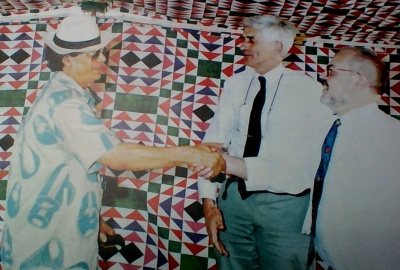
In April 2004, Black gave an in-depth interview to the Times Higher Education supplement:
- Academics do not generally receive out-of-the blue telephone calls from disgruntled members of the UK and US intelligence services - unless they are Robert Black QC, professor of law at Edinburgh University.
- The intelligence agents have been eager to discuss their concerns over the conviction of Libyan Abdelbaset al-Megrahi in 2001 for the 1988 Lockerbie bombing, which killed 270 people. Black, who describes himself as "just a quiet wee professor of Scottish provincial law", is convinced that al-Megrahi should never have been found guilty and sentenced to life in prison and has been in close contact with the Libyan's lawyers.
- Black says the intelligence staff who have contacted him have "powerful" new evidence linking the bombing of Pan Am Flight 103 to the Iran-backed Popular Front for the Liberation of Palestine (PFLP). Before the Libyan suspects entered the frame, Lockerbie investigators thought PFLP operatives were behind the bombing.
- According to Black, there are "computer printouts" showing that Iran paid $11 million (£6 million) into the PFLP's bank account on 23 December 1988, two days after the flight was blown out of the sky. Black, himself from Lockerbie, says this new evidence was passed last year to the Scottish Criminal Cases Review Commission, which is expected to decide whether the case should return to court this summer. This, in turn, could lead to al-Megrahi being cleared.
- Black thinks the information was handed over because intelligence agents thought al-Megrahi would be cleared without them having "to come out of the woodwork". "Their amazement (over the conviction) is almost as great as mine," he says.
- The law professor now finds himself in an ironic situation because he played a key role in convincing Libya to agree to have al-Megrahi and his co-defendant, Lamin Khalifah Fhimah, who was acquitted, tried under Scottish law, arguing that this would guarantee a fair trial.
- Black was approached by British engineering firms who believed the only way they could win lucrative contract work in Libya was if al-Megrahi's and Fhimah's lawyers - and the Libyan government - handed over the accused for trial. To this end, Black sent the Libyan government a dossier that outlined Scottish law and the rights of the accused. Libya took Black's dossier seriously, and in 1993 - with travel costs paid by the British companies - Black flew to the Libyan capital, via Tunisia, to meet al-Megrahi's and Fhimah's lawyer.
- Although Black was an authority on Scottish law, 95 per cent of his work until then had been as a civil lawyer. Overnight he was thrust into the middle of an international political stand-off involving the worst act of terrorism on British soil. On arrival in Tunisia, Black was met by Libyan government officials and driven for five hours at breakneck speed to Tripoli. During his first meeting with Libyan officials, it became obvious they wanted to have a clear idea of whom they were dealing with.
- "The first thing they wanted to find out was whether I was a British government stooge," Black recalls.
- After convincing them he was there as an independent expert on Scottish law, he proposed that a trial be held in the "neutral" Netherlands. There would be no jury, but three judges would rule and the court would adhere to Scottish judicial law. Libya accepted the proposal, but the US and UK governments refused outright.
- Five years later, Black returned to Libya, which by this time was impatient and threatening to withdraw support for his proposal. This time Black met Gaddafi in the president's Bedouin tent. "At first, he was not friendly," Black recalls. "He would not look me in the eye. He just looked straight ahead, with his hands folded. But I made the point that the (Labour) government had been in office for under a year and that it was still finding its feet in foreign affairs - it was possible to detect signs that its position over Lockerbie might be more flexible than that of its Conservative predecessor."
- Gaddafi agreed to accept the trial proposal for a further six months. Three months later, the UK and US governments accepted the no-jury Netherlands trial. Black, whose professional highlights before Lockerbie involved contractual law cases for hotel keepers, had masterminded a diplomatic coup.[6][7][8]
Miscarriage of justice
Responding to remarks alleged to have been made by former Lord Advocate, Lord Fraser of Carmyllie, critical of main prosecution witness Tony Gauci, and reported in The Sunday Times of 23 October 2005, Professor Black described the alleged remarks as "an indication that various people who have been involved in the Lockerbie prosecution are now positioning themselves in anticipation of the SCCRC holding that there was a prima facie miscarriage of justice and sending it back for a fresh appeal."
In an interview with The Scotsman on 1 November 2005, Professor Black said Megrahi's conviction was "the most disgraceful miscarriage of justice in Scotland for 100 years." He vowed to continue his fight to have the case brought back to the appeal courts. "I have written about this and nobody is interested," Black said. "Every lawyer who has ... read the judgment says 'this is nonsense'. It is nonsense. It really distresses me; I won't let it go."[9]
Black feels partially to blame for Megrahi's situation: "I feel a measure of responsibility for having suggested this form of procedure and having played a part in persuading the Libyans to agree to it. And then this happens. My concern is not about his guilt or innocence, although I do believe him to be innocent. My concern is that on the evidence led at Zeist, he ought never to have been convicted." Despite widespread concerns about the potential for pre-trial publicity prejudicing a jury, Black now believes the accused may have fared better under the conventional procedure than in the non-jury trial that he formulated. Black says: "If they had been tried by an ordinary Scottish jury of 15, who were given standard instructions about how they must approach the evidence, standard instructions about reasonable doubt and what must happen if there is a reasonable doubt about the evidence, no Scottish jury could have convicted Megrahi on the evidence led at the trial."
On 1 November 2007, Professor Black was invited by Mr Megrahi to visit him in prison. Black reported on this first meeting with Megrahi, as follows:
- "As a result of today's meeting, I am satisfied that not only was there a wrongful conviction, but the victim of it was an innocent man. Lawyers, and I hope others, will appreciate this distinction."[10]
Megrahi's second appeal
On 28 June 2007, the SCCRC announced that it had concluded its review and had referred Megrahi's case back to the Court of Criminal Appeal for a second appeal against conviction.[11]
After a delay of over 18 months, it was announced in January 2009 that the second appeal is scheduled to start on 27 April 2009 and that the hearing could last as long as 12 months because of the complexity of the case and volume of material to be examined.[12]
In February 2009, Professor Black proposed a number of Scots law changes so as to expedite the Lockerbie appeal verdict.[13]
Call for Public Inquiry
In September 2008, following a meeting organised by the Lockerbie Justice Group at Greshornish House on the Isle of Skye, Black and Professor Hans Köchler called for a new public inquiry into the Lockerbie bombing.[14] Black said:
- "Megrahi could go home if his appeal succeeds or if a fair appeal cannot be achieved. I am not convinced there is the political will to have the case reinvestigated, however, but one of the things we have been trying to do is to insert some backbone into those politicians who have the power to make it happen."
Letter to Malta
On 3 October 2009, Professor Black wrote to the Maltese Foreign Minister:
- The Hon Tonio Borg LLD MP
- Deputy Prime Minister, Minister of Foreign Affairs
- Ministry of Foreign Affairs,
- Palazzo Parisio,
- Merchants Street,
- Valletta VLT 1171
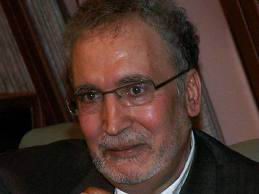
- Dear Mr Borg,
- I write to you in order to inform you of an initiative that has recently been launched with regard to the tragic loss of Pan American Flight 103 over Lockerbie in 1988 and the subsequent trial of Mr Abdelbaset al-Megrahi and Mr Lamin Fhimah at Kamp van Zeist. I include in this text box a letter which has been submitted to the President of the General Assembly of the United Nations Organisation, and a brief background note on its development.
- Furthermore, both of these texts are contained in this mail as attachments for your convenience. I will not trouble you here by repeating what will be clear upon reading both the letter to the UN and the background details. Suffice it to say that the signatories to this initiative are of the belief that both the good reputation of Malta and Luqa Airport have been quite unjustly stained by association with this affair.
- We are informed that the General Assembly simply requires one member state to table a motion putting forward this submission and thereafter a two-thirds majority vote will be necessary in order to open such an enquiry. We, therefore, hope that the Government of Malta will use its best offices to advance this cause.
- Thank you most kindly for your time and attention.
- Yours sincerely
- Robert Black
- Professor Robert Black QC FRSE[15]
Suppressor Black
In July 2012, former British diplomat Patrick Haseldine, who is often referred to as "Emeritus Professor of Lockerbie Studies", accused Professor Black of suppressing the truth about apartheid South Africa's targeting of Bernt Carlsson on Pan Am Flight 103, thus delaying justice for the 270 Lockerbie bombing victims and their families.[16] Suppressor Black angrily responded to the accusation saying it was "Another Haseldine lie".[17]
On 26 September 2013, the President of "Victims of Pan Am Flight 103, Inc", Frank Duggan, commented:
- "Interesting to see two self-promoting 'Emeritus Professors' pissing on each others legs."
In May 2014, it was reported that Robert Black - in a cynical move - had drafted an application for Jim Swire and other members of UK Families Flight 103 to send to the Scottish Criminal Cases Review Commission (SCCRC) for a further appeal to Edinburgh's High Court of Justiciary, raising hopes that the Lockerbie bombing conviction of Abdelbaset al-Megrahi might finally be overturned.[18]
Suppressor Black knows perfectly well that the odds are very heavily stacked against a successful application to the SCCRC, as explained in his April 2014 article entitled "Problems and pitfalls of new SCCRC application and appeal".[19] Sure enough, in July 2015 three Judges at the Appeal Court in Edinburgh ruled that relatives of Lockerbie bombing victims are not allowed to pursue an appeal on Megrahi's behalf.[20]
Blackout of Mandela blueprint
After years of sleuthing, Emeritus Professor of Lockerbie Studies Patrick Haseldine eventually identified British mining magnate, Observer newspaper owner and MI6 operative Tiny Rowland as the UK coordinator of the Lockerbie cover-up.[21]
Haseldine alleges that Tiny Rowland recruited Emeritus Professor of Scots Law Robert Black to organise the British Blackout and to frustrate all of Nelson Mandela’s plans for Lockerbie justice[22].
In January 1992, Mandela outlined his blueprint for the Lockerbie trial:
- If no extradition treaty exists between the countries concerned, the trial must be conducted in the country where the accused were arrested;
- The trial should be conducted in a neutral country by independent judges;
- The trial should be conducted at The Hague by an international court of justice.
Five years later, President Mandela emphasised at the Commonwealth Heads of Government Meeting (CHOGM) in Edinburgh that "no one nation should be complainant, prosecutor and judge" in the Lockerbie case.
By 1999, the so-called "architect of the Lockerbie trial" had managed to blackout the whole Mandela blueprint. Professor Black:
- ensured that the Lockerbie trial was not held in a neutral country. Instead, he arranged for the trial to be conducted from May 2000 to January 2001 at Camp Zeist, a former US Air Force base in the Netherlands which, for the duration of the trial, became British territory;
- decreed that Scotland’s Crown Office would be the ‘complainant’ at the trial;
- arranged for Scotland’s Lord Advocate Colin Boyd to be the ‘prosecutor’ at the trial; and,
- insisted that – instead of ‘independent judges’ at the trial – all four Judges (Lords Sutherland, Coulsfield, MacLean and Abernethy) had to be from Scotland.
Although one of the two accused Libyans was found not guilty of the Lockerbie bombing, Haseldine alleges it was thanks to Professor Black that the other Libyan, Abdelbaset al-Megrahi, was found guilty.[23]
Haseldine says:
.... so for the past 20 years, Professor Robert Black has been suppressing the truth about the Lockerbie disaster, thus delaying justice for the 270 victims of Pan Am Flight 103 and their relatives. Prof Black was supported in his attempt to blackout apartheid South Africa’s targeting of Bernt Carlsson on Pan Am Flight 103 by inter alia these assets of British intelligence:
John Ashton (Author, producer and researcher, see: The Maltese Double Cross[24]; the 2001 book "Cover-up of Convenience" by John Ashton and Ian Ferguson[25]; the 2012 book "Megrahi; You are my Jury" by John Ashton[26]; the 2012 article "Was Libya really behind it?" with John Ashton[27]; and a new book "Scotland’s Shame: Why Lockerbie Still Matters" that was published by Birlinn on 3 October 2013[28]);
Ian Ferguson (Author, journalist and researcher, see: The Lockerbie Trial.com website of Professor Black and Ian Ferguson; and the 2009 film Lockerbie Revisited researcher Ian Ferguson[29][30]);
Robert Forrester (Secretary of Justice for Megrahi campaign group[31]);
Andrew Fulton (former chairman of the Scottish Conservative Party)[32];
Dr Alan George (Middle East academic, recruited by solicitors Eversheds to reinforce the defence of Megrahi's co-accused Lamin Khalifah Fhimah[33]);
Dr Morag Kerr (Deputy Secretary of Justice for Megrahi campaign group, see [34], her book "Adequately Explained by Stupidity? Lockerbie, Luggage and Lies" was published on 21 December 2013 [35]); and,
Adam Larson (Associate of Dr Kerr and owner of The Lockerbie Divide website[36]).
Double dealing
In October 2009, responding to criticism by the FBI's chief Lockerbie investigator, Richard Marquise, Prof Black wrote:[37]
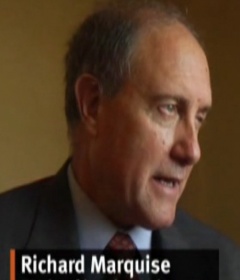
"I am, of course, used to snide remarks to the effect that my stance on Lockerbie is due to my having been paid (which I have always thought a somewhat odd criticism to make of a lawyer). Here, from a forthcoming book, is the true account of how I came to become involved in the Lockerbie issue: 'I first became involved in the Lockerbie affair in January 1993. I was approached by representatives of a group of British businessmen whose desire to participate in major engineering works in Libya was being impeded by the UN sanctions. They had approached the then Dean of the Faculty of Advocates (the head of the Scottish Bar) and asked him if any of its members might be willing to provide advice to them - on an unpaid basis! - on Scottish criminal law and procedure in their attempts to unblock the logjam. The Dean of Faculty, Alan Johnston QC (later Court of Session judge Lord Johnston), recommended me. The businessmen asked if I would be prepared to provide independent advice to the government of Libya - again on an unpaid basis - on matters of Scottish criminal law, procedure and evidence with a view (it was hoped) to persuading them that their two citizens would obtain a fair trial if they were to surrender themselves to the Scottish authorities. There was, of course, never the slightest chance that surrender for trial in the United States could be contemplated by the Libyans, amongst other reasons because of the existence there of the death penalty for murder."
Blackmailing Libya
In September 2011, The Scotsman reported that Robert Black and Tory peer David Trefgarne had been blackmailing Libya over the "work" they claimed to have done to secure the release in August 2009 of Abdelbaset al-Megrahi, who was convicted in January 2001 for the December 1988 Lockerbie bombing.
Details of a claim for "fees owed" for advice to the Libyans ahead of Megrahi's appeal case were reportedly uncovered in an abandoned farmhouse in the outskirts of Tripoli. The note (dated 4 June 2007 - 24 days before publication of the SCCRC report) from Lord Trefgarne said while the £940,000 fee "may seem a large sum" it covered "nine years' work".
In a joint statement, Lord Trefgarne and Prof Black said that in 1993 they began working towards unblocking the "impasse" that was preventing Megrahi's trial taking place because Libya refused to extradite him to Scotland or the United States. The statement added:
"Over the course of the next six years, Lord Trefgarne and Professor Black worked strenuously to secure acceptance of the neutral venue scheme that Professor Black formulated in early 1994.
"No payment was sought or received for these endeavours. It was only after Abdelbaset Ali Mohmed Al Megrahi's conviction at Camp Zeist in January 2001 and Professor Black had publicly expressed the strong view that that conviction was legally unwarranted, that an agreement was entered into with his lawyer, Dr Ibrahim Legwell, that Lord Trefgarne and Professor Black should receive payment for future political and legal advice on avenues of appeal. In the event, the only sum actually paid barely covered expenses. Lord Trefgarne and Professor Black again emphasise that this was an entirely proper arrangement reflecting the circumstances of the time.
"Lord Trefgarne did declare this matter in the House of Lords Register in accordance with the rules then in force."
But Dumfries & Galloway Labour MP Russell Brown said the public would be "surprised" to hear of Lord Trefgarne's claim.
"Lord Trefgarne was one of the people who lobbied the SNP to release the Lockerbie bomber just days before Kenny MacAskill visited the terrorist in jail," he said.
"Now it seems he was in the pay of the Libyans."[38][39]
Blackballing Patrick Haseldine
On 14 January 2014, these three comments appeared on Professor Black's The Lockerbie Case blog in relation to an article by William Blum in the Foreign Policy Journal of 10 January 2014:[40]
1. pesceman said: So we know al-Megrahi was innocent. Of that there is no doubt. Why was the Heathrow break-in totally ignored from the very start - the Anti-Terrorism Police in the UK don't seem able to recall the event at all???? It is pretty obvious that the South African Civil Cooperation Bureau were wholly responsible and assisted in the cover up by UK Intelligence and UK Police.
2. Robert Black said: It is by no means obvious. And the notion that the CCB was responsible stems from Patrick Haseldine's fevered imagination. There is nothing whatever that counts as evidence to support it. No further comments giving credence to Mr Haseldine's ravings will be accepted on this blog.
3. Quincey Riddle aka Robert Forrester said: Dear Peaceman, I agree entirely with Robert Black vis-a-vis the South African theory. Mr Haseldine is frankly certifiably doolally and an extremely manipulative individual, whom I felt obliged to expel from JFM for his conduct. I would be careful too about laying too much store on the issue of the Heathrow break-in as being linked to Pan Am 103, maybe it was maybe it wasn't. In my view, the only significant factor here is that COPFS appears to have hidden a tree in a forest in terms of the evidence made available to the defence. That from my perspective is as reprehensible as the Gauci payments being denied to the court. Robert.
Lockerbie verdict dialectic
On 8 July 2014, "Dave" posted a series of comments on Robert Black's blog challenging the logic of the Lockerbie verdict. "RB" reacted by threatening to ban him from commenting:
- Dave When Attorney General Lord Goldsmith was ‘pinned against the wall’ and told to state the Iraq invasion was legal and he obliged days before the invasion to avoid a mutiny from British military high command (who didn’t like the idea of being arrested for war crimes) was this really any different from what the Zeist Judges did (indirectly at the behest of their Lord Advocate) who had probably been ‘pinned up against a wall’ too to ensure a guilty verdict for geo-political (economic) reasons?
- And yet despite no WMDs which must compound the illegality of the decision (also illegal under the terms of the UK anti-terrorism Act 2000), Tony Blair continues to promote ‘war for personal profit’ with the backing of the US/neo-con lobby with the official title of ‘Peace Envoy’.
- And this is all in the public domain, so 7 years' hard labour seeking the truth about Lockerbie, is no real surprise and will require a political voice to change. It’s very naive (or something else) to pretend the State would stage a show trial and allow a not guilty verdict![41]
- RB My view on the Judges' true (if subconscious) motivation for returning one guilty verdict can be found in the article reproduced in this very post (third para of section headed "The implications for the Scottish criminal justice system") and also in the very first post on this blog ("Lockerbie: A satisfactory process but a flawed result") footnote 2 and accompanying text.[42]
- Dave There would have been considerable pressure on the Judges to do their patriotic duty and find the two suspects guilty in defence of the system and Lord Advocate.
- And they did their duty by finding Abdelbaset al-Megrahi guilty, after saying he was innocent in their summing up!
- But to salve their conscience the judges announced to the world that Zeist was a show trial by finding Lamin Khalifah Fhimah not guilty.
- Because how can you convict one without the other on a conspiracy charge?[43]
- RB Dave, the Crown withdrew the conspiracy charge. All that the Judges were required to consider (and all that they returned verdicts on) were the murder charges against Megrahi and Fhimah.[44]
- Dave When exactly was the conspiracy charge dropped, before or during the trial?[45]
- RB On 9 January 2001, which was during the trial.[46]
- Dave Thanks Professor,
- Dropping the conspiracy charge was a remarkable thing to happen because it becomes an admission about the lack of evidence despite years preparing a case based on a conspiracy to plant a bomb.
- But without the conspiracy charge being dropped the Judges would have had to find both defendants innocent or guilty.
- Thus was the conspiracy charge dropped by the Crown as a back room deal to allow the (protesting) Judges to do their patriotic duty by finding one guilty without having to go completely against their conscience and the evidence by finding both guilty?[47]
- RB I don't believe for a second that there was a backroom deal between the Crown and the Judges. The scuttlebutt within the Scottish legal profession was that two of the Judges wanted to convict both accused and one wanted to acquit both. The compromise (because anything other than a unanimous verdict in this case would have been intolerable from a PR standpoint) was to convict one and acquit the other. The scuttlebutt goes on to say that the Judge who was for acquittal has ever since regretted agreeing to the compromise. Maybe we'll find out if there is any truth in this once he dies.[48]
- Dave There was a conspiracy charge against both and no evidence against either and a guilty verdict against one but not the other, but only possible because the conspiracy charge was dropped.
- But why would a conspiracy charge be dropped when the evidence against both was so strong, unless the selected Judges were not impressed with the evidence, clearly evident in their summing up.
- Thus, a deal must have been done, normally known as a plea bargain, but with the Judges, not the defendants![49]
- RB This is utter nonsense, Dave. The Crown were as surprised as everyone else in the courtroom (and beyond) when the Judges returned a verdict of guilty against Megrahi. If you are going to continue contributing (on my blog), please stop posting comments about what "must" have happened and start concentrating on what actually did.[50]
Mickey Mouse tribunal
In September 2014, Robert Black was accused by Lockerbie campaigner Barry Walker of having created a Mickey Mouse tribunal at Camp Zeist in the Netherlands:
- "To be honest I regard you as largely responsible for Megrahi's actual conviction (through the design of the Mickey Mouse tribunal that actually convicted him) but then I regard Justice for Megrahi as an oxymoron."[51]
Barry Walker was then banned from commenting further on Professor Black's blog:
- The above is your last comment on this blog, Baz. Find another platform for your bitterness and bile.[52]
On 7 April 2015, Baz's banning was recorded in this tweet: Prof Black banned policeman Baz/Barry Walker over#Lockerbie #MickeyMouseTribunal jibe![53]
Adequately Explained by Government-fed Propaganda?
On 14 October 2013, BenSix posted this Tweet:
- "Imminent and intriguing book from Dr Morag "Rolfe" Kerr on the Lockerbie bombing."[54]
A long series of increasingly acrimonious Tweets between Steven Raeburn, Robert Black and Morag Kerr then ensued.
Professor Black tweeted:
- "I have always found that it's a good idea to read a book before criticising its contents."[55]
Steven Raeburn tweeted:
- "Odd that "Rolfe" gets apoplectic and abusive at these contents.[56]
- "Dangerous, suspicious Government-fed propaganda, based on the discredited Feraday/Hayes lies. Beware."
Morag Kerr tweeted:
- "Government-fed? Who do you think gave me the evidence?"[57]
Patrick Haseldine joined the conversation by tweeting:
- "Morag aka #SlimVirgin is #MI5 agent, so defo Govt-fed propaganda."[58]
On 15 October 2013, The Firm magazine tweeted:
- "Good old fashioned twitter spat between @MrStevenRaeburn @drmoragkerr and @rblackqc last night. See the RT's to follow...[59]
Patrick Haseldine tweeted:
- "Adequately Explained by Government-fed Propaganda?", which was Retweeted by The Firm to its 5,448 followers.[60]
Part-time in South Africa
In 2005 Black took 'semi retired' status, before retiring altogether in 2006. He asserts that he is one of a dying breed of legal academics: "Most academic lawyers, years ago, were like me – they had come up through the ranks of the practising profession. That's unusual these days. In many cases they have never advised a human being with a legal problem in their lives."
Professor Black spends six months each year at the guesthouse he owns in South Africa: Gannaga Lodge is situated in 20 hectares of its own ground within the Tankwa National Park. It is located in the Roggeveld Karoo, in some of the most spectacular countryside in the Northern Cape, at the summit of the breathtaking Gannaga Pass.[61]
An Office Holder on Wikispooks
| Name | From |
|---|---|
| Robert Black | 2005 |
Related Documents
| Title | Type | Publication date | Author(s) | Description |
|---|---|---|---|---|
| Document:Ex-Scottish Government Ministers: Political Consequences of Public Statements | Letter | 16 March 2018 | Robert Forrester | Professor Robert Black said that Kenny MacAskill’s contention in his new book that Abdelbaset al-Megrahi had not bought the clothes wrapped around the explosive device that destroyed Pan Am Flight 103 amounted to “the end of the conviction”. |
| Document:Justice for Megrahi - Black's lies matter | Letter | 18 April 2021 | Patrick Haseldine | Don't let Suppressor Black mess up again at the UK/Supreme Court: much better to employ an English lawyer such as Gareth Peirce with a proven track record of success (Guildford Four, Birmingham Six etc.) |
References
- ↑ "Biography on the Edinburgh University School of Law website"
- ↑ "Architect of the Lockerbie trial"
- ↑ "Architect of Lockerbie trial attacks guilty verdict"
- ↑ "Pressure grows for explanation in Lockerbie witness dispute"
- ↑ "Lockerbie bomber Abdelbaset Al Megrahi released from jail on compassionate grounds"
- ↑ "Banking on more reliable evidence"
- ↑ "Gaddafi meets Lockerbie lawyer"
- ↑ "From Lockerbie to Zeist"
- ↑ Jennifer Veitch, "Architect of Lockerbie trial vows to fight for an appeal", The Scotsman, 1 November 2005.
- ↑ "A prison visit"
- ↑ "Libyan jailed over Lockerbie wins right to appeal"
- ↑ "Secret talks on deal to return Megrahi to Libya"
- ↑ "Expert devises changes in law to speed Lockerbie appeal verdict"
- ↑ "Legal experts call for new public inquiry on Lockerbie bomb"
- ↑ "Letter to Malta"
- ↑ "Blackout over Lockerbie"
- ↑ "Another Haseldine lie"
- ↑ "Lockerbie bombing: Megrahi conviction review sought by families"
- ↑ "Problems and pitfalls of new SCCRC application and appeal"
- ↑ "Scottish judges refuse permission for third appeal"
- ↑ "Tiny Rowland, Lonmin and Lockerbie
- ↑ "Blackout of Mandela Blueprint for Lockerbie Justice"
- ↑ "Blackout of Mandela Blueprint for Lockerbie Justice"
- ↑ "Commentary on The Maltese Double Cross"
- ↑ "Cover-up of Convenience"
- ↑ "Megrahi: You are my Jury"
- ↑ "Was Libya really behind it?"
- ↑ "Scotland’s Shame: Why Lockerbie Still Matters"
- ↑ "Lockerbie Revisited"
- ↑ "Lockerbie Cover-Upper Ian Ferguson"
- ↑ "Robert Forrester Facebook page"
- ↑ "Former MI6 spy joins Armor Group to hunt down new business"
- ↑ "Alan George libel case
- ↑ "Dr Morag Kerr should drop all this cloak and dagger 'Rolfe' nonsense"
- ↑ "Adequately Explained by Stupidity? Lockerbie, Luggage and Lies"
- ↑ "The Lockerbie Divide"
- ↑ "Responding to criticism by the FBI's Richard Marquise"
- ↑ "Tory peer and leading Scots lawyer in Megrahi cash row"
- ↑ "Ex-minister's $1.5m bill to Libya"
- ↑ "The Bombing of Pan Am Flight 103: Case closed?"
- ↑ "Pinned against the wall"
- ↑ "Motivation for returning one guilty verdict"
- ↑ "How can you convict one without the other on a conspiracy charge?"
- ↑ "The Crown withdrew the conspiracy charge"
- ↑ "When exactly was the conspiracy charge dropped, before or during the trial?"
- ↑ "Conspiracy charge dropped on 9 January 2001 which was during the trial"
- ↑ "A back room deal?"
- ↑ "Scuttlebutt was that two of the Judges wanted to convict both accused and one wanted to acquit both"
- ↑ "A deal, normally known as a plea bargain, must have been done"
- ↑ "Watch it Dave or I'll ban you from commenting"
- ↑ "Professor Black's Mickey Mouse tribunal"
- ↑ "Barry Walker banned from commenting further on Professor Black's blog"
- ↑ "Prof Black banned policeman Baz/Barry Walker over #Lockerbie #MickeyMouseTribunal jibe!"
- ↑ "BenSix on Twitter
- ↑ "Good idea to read the book"
- ↑ "Rolfe gets apoplectic and abusive"
- ↑ "Who do you think gave me the evidence?"
- ↑ "defo Govt-fed propaganda"
- ↑ "See the ReTweets to follow..."
- ↑ "Adequately Explained by Government-fed Propaganda? Retweeted by The Firm"
- ↑ "Gannaga Lodge in South Africa's Tankwa National Park"
External links
- "Blackout of Mandela Blueprint for Lockerbie Justice"
- "Professor Black's home page at the Law School, University of Edinburgh"
Wikipedia is not affiliated with Wikispooks. Original page source here
